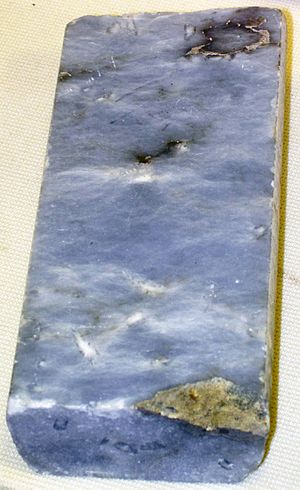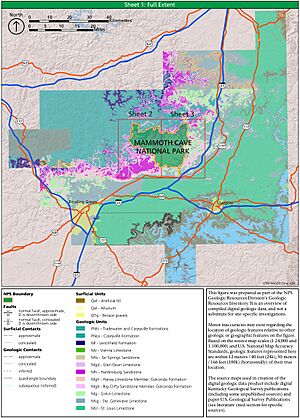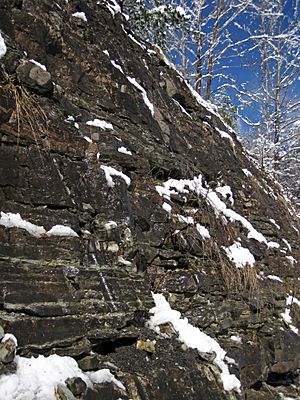St. Louis Limestone facts for kids
Quick facts for kids St. Louis LimestoneStratigraphic range: Mississippian Sub-period |
|
|---|---|

Rock anhydrite (St. Louis Limestone; subsurface gypsum mine in Martin County, Indiana)
|
|
| Type | Geological formation |
| Unit of | Blue River Group |
| Sub-units | Dover Chert, Horse Cave Member, Sisson Member |
| Underlies | Ste. Genevieve Limestone |
| Overlies | Salem Formation |
| Thickness | up to 100 feet (30 m) |
| Lithology | |
| Primary | Limestone |
| Other | Shale, chert |
| Location | |
| Region | Illinois, Indiana, Tennessee, Kentucky and Missouri |
| Country | United States |
| Type section | |
| Named for | St. Louis, Missouri |
| Named by | Englemann |
| Year defined | 1847 |


The St. Louis Limestone is a special type of rock layer found in the middle of the United States. It is named after the city of St. Louis, Missouri, where it was first studied. This rock is mostly made of limestone, which is a common rock formed from the shells and skeletons of ancient sea creatures. You can also find bits of chert, a very hard rock, mixed in.
Contents
Discovering the St. Louis Limestone
The St. Louis Limestone is a large geologic formation. This means it is a distinct layer of rock that geologists can identify and map. It covers a wide area across several states, including Illinois, Indiana, Tennessee, Kentucky, and Missouri.
How Old is This Rock?
This limestone formed during a time called the Mississippian Sub-period. This was about 330 to 340 million years ago! That's a very long time before dinosaurs even walked the Earth. During the Mississippian, much of North America was covered by warm, shallow seas.
What is Limestone and Chert?
Limestone is a sedimentary rock. It forms when tiny bits of shells, corals, and other sea life settle on the ocean floor and get pressed together over millions of years. This is why limestone often contains fossils.
Chert is another type of sedimentary rock. It is very hard and is made of tiny crystals of quartz. Sometimes, the St. Louis Limestone has many layers of chert, like the Lost River Chert Bed.
Where Can You Find It?
You can see the St. Louis Limestone exposed at the surface in places like western Kentucky and Middle Tennessee. For example, it is found around the city of Clarksville, Tennessee. These exposed areas are called "outcrops," and they help scientists study the rock.
Ancient Life in the Limestone
The St. Louis Limestone is famous for the fossils it contains. These fossils are like clues that tell us about the ancient life that lived in the seas millions of years ago.
Common Fossils Found
Two types of rugosan corals, called Lithostrotion and Lithostrotionella, are often found in this limestone. Corals are marine animals that build hard skeletons.
Another common fossil is the Fenestrellina, which is a type of bryozoan. Bryozoans are tiny colonial animals that often look like delicate lace or small branches. Finding these fossils helps scientists understand what the ancient oceans were like.
 | John T. Biggers |
 | Thomas Blackshear |
 | Mark Bradford |
 | Beverly Buchanan |

